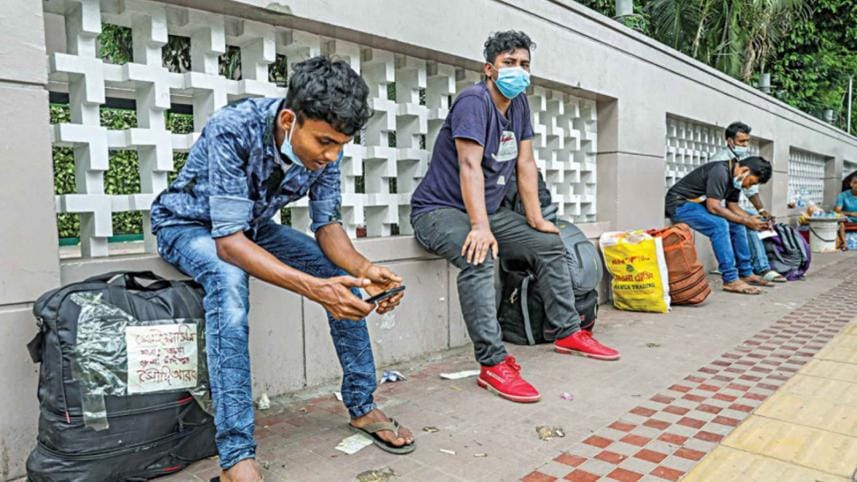How the Bangladesh National Qualifications Framework will connect education and training to the job market

The Bangladesh National Qualifications Framework (BNQF) combines general education, technical-vocational education and higher education into one harmonised, quality-assured system. For four years, the ILO Bangladesh has been supporting the Technical and Madrasah Education Division (TMED) of the Ministry of Education to develop this framework and define clear pathways, level descriptors and a concrete structure for the BNQF.
The government has demonstrated its commitment to the BNQF by setting up a National Steering Committee (NSC) chaired by the Minister of Education. It has also set up seven technical working groups, headed by senior education officials.
Extensive technical consultations were held with senior level officials from the general education, technical and vocational education and training (TVET), and madrasah system, as well as representatives from the agriculture, engineering and medical education sectors. The TMED and Secondary and Higher Education Division coordinated the whole process, which was finalised and endorsed at the NSC meeting on June 3, 2021. The BNQF will now gradually come into effect through the development of a quality assurance system, implementation guidelines, and the legislation.
Alongside different education and training agencies, professional organisations, industry bodies like the Bangladesh Employers Federation (BEF) and the National Coordination Committee on Workers Education (NCCWE) worked together for the vision of BNQF to become a reality. The structure of BNQF is based on the framework for technical education (NTVQF), which was developed by the government of Bangladesh in 2011 in collaboration with the ILO and the European Union. The NTVQF is directly linked to the National Skills Development Policy 2011.
The BNQF includes ten levels of qualifications based on increasing complexity of learning outcomes expressed in three domains—knowledge, skills and attitudes. The BNQF provides access to qualifications, which assist people to move easily and seamlessly between the different education sectors and the labour market. The BNQF upholds lifelong learning and increases the employability of graduates through open and flexible qualification pathways, recognition of prior learning (RPL) and credit transfer.
Now, the question is how the BNQF will work in the real world and what it means for workers and employers. Let us take the example of a young girl from Gaibandha, who started working in a factory after her SSC/HSC exams and stopped her education. After five years, if she decides to get a skills certificate for her career growth, she can obtain national certification through short training or assessment from a TVET institution. With that certificate, she could upgrade her position at the workplace, and later, she will have further opportunities for higher-level skill certification or higher education, which will lead her towards further professional development or open windows for further education.
Another important facet of the BNQF is how it aims to deepen support for labour mobility through increased recognition of the value and comparability of different qualifications in Bangladesh. The BNQF promotes international recognition, equivalence and comparability of qualifications through bilateral or multilateral mutual recognition arrangements (MRA), and harmonisation of qualifications through regional frameworks. Providing skills and qualifications equivalent with the standards of other countries would allow Bangladeshi workers to stand in a similar position with their counterpart migrant workers from other countries.
In the context of the fourth Industrial revolution and increasing automation, labour market trends are showing a shift to jobs that require higher skill levels. A recent analysis of 200,000 jobs in 29 countries by Price Water Coopers shows that 44 percent of workers' jobs will be displaced by mid-2030s by the automation. On the other hand, a McKinsey report shows 26 million new jobs will be created by the advent of online services. In this situation, Bangladesh's workers must not and cannot be left behind.
This is why the Prime Minister of Bangladesh called for a BNQF, one that offers flexible entry and exit to students in the different national education streams. In addition, BNQF has the power to put in place the mechanisms that will help workers and employers to re-skill, find work, change occupation and create jobs. A BNQF will help a worker's professional career development and lifelong learning opportunity.
Millions of migrant workers leave Bangladesh without any formal recognition of their skills or experiences. They then return home without any further recognition for the additional skills they acquired working overseas. The ILO and the Ministry of Expatriates' Welfare and Overseas Employment are now exploring ways to introduce a National Skills Passport (NSP) for millions of migrants workers, based on the BNQF.
All those involved are now working to bring the BNQF into force as soon as possible to reap the benefits of the country's demographic dividend. This will help employers—home and abroad—to find the right person for the right job with the right skills. It will also help the government in undertaking long-term skills planning for the economy and for future employment creation. The BNQF is thus a fundamental cornerstone for the future prosperity of the country and its citizens.
Tuomo Poutiainen is Country Director at the Country Office for Dhaka of the International Labour Organization.




 For all latest news, follow The Daily Star's Google News channel.
For all latest news, follow The Daily Star's Google News channel.
Comments